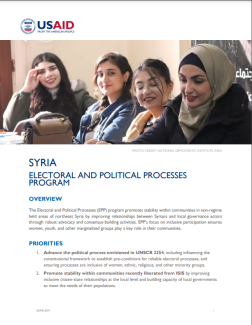The Electoral and Political Processes (EPP) program promotes stability within communities in non-regime held areas of northeast Syria by improving relationships between Syrians and local governance actors through robust advocacy and consensus-building activities. EPP’s focus on inclusive participation ensures women, youth, and other marginalized groups play a key role in their communities.
Priorities
- Advance the political process envisioned in UNSCR 2254, including influencing the constitutional framework to establish pre-conditions for reliable electoral processes, and ensuring processes are inclusive of women, ethnic, religious, and other minority groups.
- Promote stability within communities recently liberated from ISIS by improving inclusive citizen-state relationships at the local level and building capacity of local governments to meet the needs of their populations.
- Strengthen local grassroots organizations to engage with local government and develop analysis and insight on election processes and service delivery.
- Strengthen women’s participation in local decision-making bodies.
Key Results
- The Syrian Negotiation Commission’s Election Technical Committee (ETC) developed 12 proposals on constitutional electoral principles.
- In coordination with 27 grassroots civil society organization partners, the project launched 11 locally-led advocacy campaigns that address the most pressing issues affecting their communities, from dealing with dignified return, better living conditions, and more effective integration and inclusion
- The project supported four Women Peace Circles in hosting dialogues in Raqqa, Qamishli, Tabqa and Derik.
- Supporting the reintegration of returnees from the Al Hol refugee camp through the establishment of legal clinics in Raqqa, consultations with women-headed households, and obtaining official approval from local authorities in Deir Ezzor, Tabqa, and Manbij to replicate the Legal Clinics.


